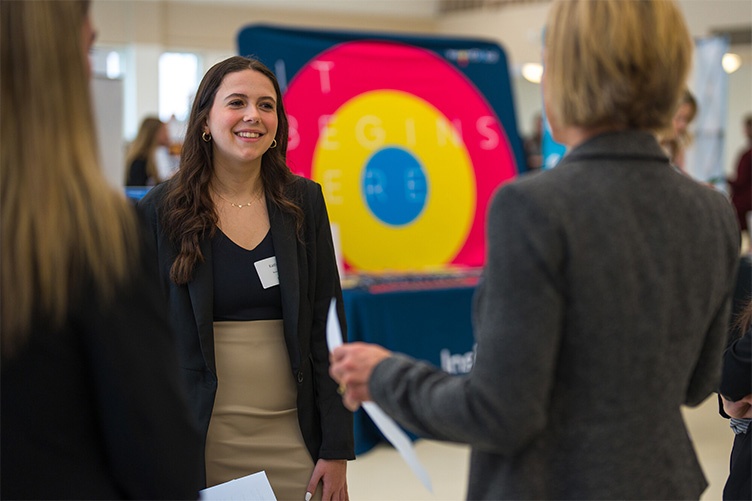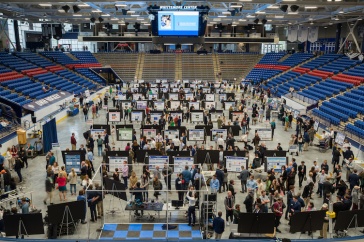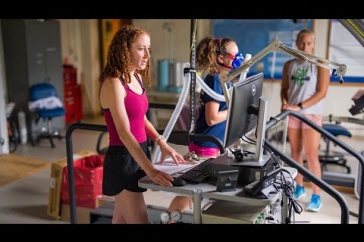
New initiatives from the office of Career and Professional Success (CaPS) include the Campus-2-Career program, which allows students to build professional development into their on-campus jobs. Participants in the pilot phase noted improved confidence and communication skills that they applied in settings like career fairs.
Seventy-eight percent of undergraduate students at UNH completed at least one internship prior to graduation, according to the most recent First Destination survey. Where some might see a measure in which UNH is outpacing the national average, the team in the Career and Professional Success (CaPS) office sees almost a quarter of the undergrad population available for an opportunity.
With a focus on students who have previously been underserved, CaPS has rolled out a pair of new initiatives aimed at expanding access to experiential education, with a goal of making internships and internship-like experiences available to every Wildcat.
“We know an internship is one of the most powerful and impactful experiences a student can have while at UNH. So many students tell us after they graduate that an internship was a primary factor in their success,” says Gretchen Heaton, associate vice provost, career and professional success and high impact practices. “We already have about 75% of students who are participating in internships, but we want that to be 100%, and we’re doing everything we can to get there.”
The strategic expansion of offerings is centered in two key initiatives: the creation of a high-impact practices unit – which includes an innovative Campus-2-Career program piloted last year that focuses on professional development for on-campus student workers – and the expansion of an employer relations unit to better establish and enhance connections to regional companies and organizations who are or could be employing UNH students.
The initiatives are intended to be key drivers of student success and workforce development, Heaton says, both areas of focus for the university.
“These kinds of high-impact experiences for students are critical to our mission as a land grant, public research university,” UNH President Elizabeth Chilton says. “Experiential learning and internships are a key way for students to expand their professional networks and build a toolkit of skills that will prepare them for their careers and for their lives. UNH is committed to expanding these opportunities for our students.”
A centerpiece of the high-impact practices unit is the Campus-2-Career program, which is entering the expansion phase after being piloted last year. Participating students are given opportunities for professional development as part of their paid work hours, Heaton says, with curricula designed to help support them and their manager in setting goals to help the students develop skills for professional success in certain key areas.
The students are paid to complete the professional development work and are evaluated by their manager, often with an opportunity to receive micro-credentials in their areas of focus.

It’s a unique approach that helps make professional development available to a population that might not be able to accept something like an unpaid internship, Heaton says. The program is groundbreaking in the higher-ed space, she says, and could position UNH as a trailblazer if other universities use the structure as a blueprint.
“We are really innovating and potentially developing something that could be a national model for other universities around how you provide impactful professional development for students during their on-campus job,” Heaton says.
Students who took part in the pilot version of the program last year report positive outcomes, having developed key skills and professional confidence. Kaylee Finch ’25, who completed two hours weekly focused on communicated-related areas, says the program helped her improve her public speaking, presentation and overall communication skills.
She utilized podcasts, TED talks and readings to improve in those areas, and also completed an end-of-year reflection presentation that she found particularly valuable.
“My confidence in my communication skills has improved greatly through the program,” Finch says. “It has given me resources and skills that have made me feel better equipped to communicate with a wide variety of people in different settings.”
Durga Raja ’25 says she similarly developed confidence that has made her more comfortable speaking with employers, especially at career fairs. She says she thinks those skills will play an important role in the upcoming job search process.
Campus-2-Career helped her sharpen her skills in several key areas, including “active listening, giving constructive feedback, approaching situations with empathy and treating all people with respect and belonging” – much of which she has already been able to put into practice.
“I’ve been able to implement what I learned in the program in my fellowships and internships over the past two years,” Raja says. “I was able to use the skills I’ve worked on to prepare for the Undergraduate Research Conference, my fellowship showcase presentations and presentations I’ve done internally at my host organization.”
The expansion of the employer relations unit should open doors to more student opportunities, as well. The unit will focus on expanding capacity by working with employer partners, Heaton says.
One target will be employers who don’t currently have internship programs, as the unit intends to consult and advise on ways to develop a framework that is impactful and beneficial for both the student and the employer. An additional goal is to highlight the ways in which unpaid internships can be a barrier for certain students and to advocate for the importance of funded student opportunities.
"Our employer partners are eager to engage with students in the Campus-2-Career program, recognizing it as a high-impact opportunity for students to showcase the in-demand skills crucial for the ever-evolving future," says Raina Sprague, executive director of employer relations and operations. "The program also enables employers to easily identify students who have acquired these valuable micro-credentials. Through our employer relations efforts, we can strategically highlight and promote these skills-focused experiences, helping more employers effectively identify top talent from UNH."
Taken in combination, the new CaPS initiatives are a big step toward making experiential opportunities part of the UNH experience for anyone who enrolls, and a significant and groundbreaking differentiator for the university when students are looking for the best value they can get out of the college experience.
“I really don’t know of another university that is doing something so intentional. We have created a unit to address equity and to innovate career development in a way that hasn’t been done before,” says Heaton. “I think that’s really exciting and speaks to the investment the university has made in career development. It’s so critical to the return on investment for our students, and UNH is putting its money where its mouth is.”
-
Written By:
Keith Testa | UNH Marketing | keith.testa@unh.edu

















































